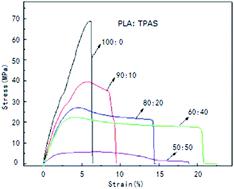Our official English website, www.x-mol.net, welcomes your
feedback! (Note: you will need to create a separate account there.)
Study on the biodegradability of modified starch/polylactic acid (PLA) composite materials
RSC Advances ( IF 3.9 ) Pub Date : 2020-7-13 , DOI: 10.1039/d0ra00274g Meihong Yu 1 , Yongjie Zheng 1 , Jingzhi Tian 1
RSC Advances ( IF 3.9 ) Pub Date : 2020-7-13 , DOI: 10.1039/d0ra00274g Meihong Yu 1 , Yongjie Zheng 1 , Jingzhi Tian 1
Affiliation

|
In this work, polylactic acid/thermoplastic acetylated starch (PLA/TPAS) composites were prepared using PLA as a matrix material and TPAS as a modifier. TPAS is based on acetylated starch, which is plasticized using glycerin. Analysis of the mechanical, thermal, and dynamic mechanical properties, and morphological structures of the PLA/TPAS composites shows that with an increase in the TPAS content, the toughness of the PLA/TPAS composites significantly improves. When the amount of TPAS added is 40% by weight, the elongation at break is increased 4 times. At the same time, the addition of TPAS has little effect on the thermal stability of the composites. Differential scanning calorimetry (DSC), dynamic mechanical analysis and scanning electron microscopy (SEM) analysis results show that PLA is incompatible with TPAS. The addition of TPAS promotes the crystallization of PLA, resulting in a decrease in the thermal stability but limits the degradation behavior during the processing of the material, which has little effect on the performance of the material. High temperature and high humidity soil degradation and ultraviolet radiation aging experiments on PLA/TPAS composites show that the PLA/TPAS composites have good biodegradability. In soil burial degradation experiments, the degradation rate of the pure PLA material is slow, and its final mass retention rate is high. The PLA/TPAS composites degrade fast. In ultraviolet radiation aging experiments, the tensile strength of the PLA/TPAS composites was improved to a certain extent after exposure to ultraviolet radiation. With an increase in the ultraviolet irradiation time, the tensile properties of the PLA/TPAS composites gradually decreased.
中文翻译:

改性淀粉/聚乳酸(PLA)复合材料的生物降解性研究
在这项工作中,以PLA为基体材料,TPAS为改性剂,制备了聚乳酸/热塑性乙酰化淀粉(PLA/TPAS)复合材料。TPAS 基于乙酰化淀粉,使用甘油增塑。对PLA/TPAS复合材料的力学、热力学和动态力学性能以及形貌结构的分析表明,随着TPAS含量的增加,PLA/TPAS复合材料的韧性显着提高。当TPAS的添加量为40重量%时,断裂伸长率增加4倍。同时,TPAS的加入对复合材料的热稳定性影响不大。差示扫描量热法(DSC)、动态力学分析和扫描电子显微镜(SEM)分析结果表明PLA与TPAS不相容。TPAS的加入促进了PLA的结晶,导致热稳定性下降,但限制了材料加工过程中的降解行为,对材料性能影响不大。PLA/TPAS复合材料的高温高湿土壤降解和紫外线老化实验表明,PLA/TPAS复合材料具有良好的生物降解性。在土埋降解实验中,纯PLA材料的降解速度较慢,其最终保质率较高。PLA/TPAS 复合材料降解速度快。在紫外辐照老化实验中,PLA/TPAS复合材料在紫外辐照后的拉伸强度有一定程度的提高。随着紫外线照射时间的增加,
更新日期:2020-07-13
中文翻译:

改性淀粉/聚乳酸(PLA)复合材料的生物降解性研究
在这项工作中,以PLA为基体材料,TPAS为改性剂,制备了聚乳酸/热塑性乙酰化淀粉(PLA/TPAS)复合材料。TPAS 基于乙酰化淀粉,使用甘油增塑。对PLA/TPAS复合材料的力学、热力学和动态力学性能以及形貌结构的分析表明,随着TPAS含量的增加,PLA/TPAS复合材料的韧性显着提高。当TPAS的添加量为40重量%时,断裂伸长率增加4倍。同时,TPAS的加入对复合材料的热稳定性影响不大。差示扫描量热法(DSC)、动态力学分析和扫描电子显微镜(SEM)分析结果表明PLA与TPAS不相容。TPAS的加入促进了PLA的结晶,导致热稳定性下降,但限制了材料加工过程中的降解行为,对材料性能影响不大。PLA/TPAS复合材料的高温高湿土壤降解和紫外线老化实验表明,PLA/TPAS复合材料具有良好的生物降解性。在土埋降解实验中,纯PLA材料的降解速度较慢,其最终保质率较高。PLA/TPAS 复合材料降解速度快。在紫外辐照老化实验中,PLA/TPAS复合材料在紫外辐照后的拉伸强度有一定程度的提高。随着紫外线照射时间的增加,











































 京公网安备 11010802027423号
京公网安备 11010802027423号